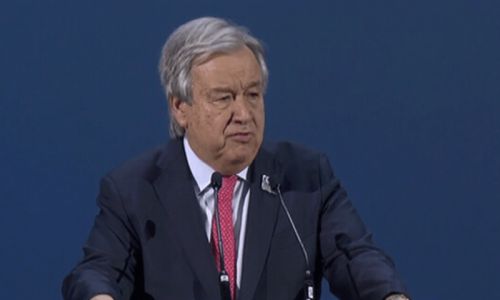• $777m pledged for eradication of tropical diseases
• COP president courts controversy with remarks denying link between fossil fuels and warming
DUBAI / ISLAMABAD: The United Arab Emirates and several charities at the UN climate summit on Sunday offered $777 million in financing for eradicating neglected tropical diseases, as physicians, activists and country representatives called for greater efforts to protect people from the increasing health and safety risks posed by climate change.
Climate-related factors “have become one of the greatest threats to human health in the 21st century”, COP28 President Sultan Ahmed Al-Jaber said in a statement.
In her remarks, the World Health Organisation’s (WHO) Dr Maria Neira said, “Everyone needs to know this is not just about climate, polar bears and glaciers. This is about my lungs and your lungs.”
Late on Saturday, 123 of the nearly 200 countries gathered at COP28 signed a declaration acknowledging their responsibility to keep people safe.
The pledges, made as the COP28 summit on Sunday focused on climate-related health risks, included $100 million from the UAE and another $100 million from the Bill and Melinda Gates Foundation.
Others to announce funds for climate-related health issues included Belgium, Germany and USAID.
The World Bank also launched a programme to explore possible support measures for public health in developing countries, where climate-related health risks are especially high.
Switching gears
The COP28 summit switched gears On Sunday as proceedings shifted to detailed discussions and negotiations that will last through the next several days. Moments of tension were also witnessed, as climate activists staged a demonstration outside the UN-controlled Blue Zone against Israel’s bombing in Gaza, which resumed on Saturday.
Separately, COP President Sultan Al Jaber courted controversy when he declared that there is no science to show that phasing out fossil fuels would achieve the world’s climate goals.
Although he acknowledged that it was “inevitable”, Mr Jaber said that removing fossil fuels would take the world “back into caves”.
The comments came during a testy exchange with former Irish leader Mary Robinson during an online forum.
“I’m not in any way signing up to a discussion that is alarmist,” Jaber told the SHE Changes Climate online conference on November 21.
“I am factual and I respect the science, and there is no science out there, or no scenario out there, that says that the phase-out of fossil fuels is what’s going to achieve 1.5.”
However, the remarks invited criticism from the scientific community, which pointed out that the latest IPCC report shows a variety of ways to limit warming to 1.5C — all of which indicate a de facto phase-out of fossil fuels in the first half of the century.
Pledge by development banks
In addition, ten of the world’s top development banks — including the World Bank and regional peers — pledged to step up their climate efforts at the COP28 summit.
A joint statement by the COP Presidency and multilateral development banks (MDBs) highlighted the need for an inclusive climate-finance framework.
It was co-signed by African Development Bank, Asian Development Bank, Asian Infrastructure Investment Bank, Council of Europe Development Bank, European Bank for Reconstruction and Development, European Investment Bank, InterAmerican Development Bank Group, Islamic Development Bank, New Development Bank and the World Bank Group.
The statement said the stakeholders had agreed to a framework that places importance on “an increased focus on measuring results and outcomes, analytics for impact, long-term strategies, country-level collaboration, attracting private capital at scale, and supporting efforts on adaptation and disaster risk management.”
WB, ADB projects
The World Bank’s Climate and Health Programme will include generating evidence on the most cost-effective interventions to tackle climate and health crisis; increasing financing for solutions that can build sustainable and resilient health systems in client countries; and build strong partnerships to amplify impact.
Specifically, the programme will create evidence and knowledge to identify country needs and inform investments; invest in solutions that are country-tailored and evidence-based and scale-up investments for low-carbon resilient health systems; and work in partnership with WHO, Gavi, foundations, and others to maximize impact by supporting global, regional, and country efforts to scale up climate-health action.
Meanwhile, the Asian Development Bank launched a new initiative on Sunday to help assess and manage climate and disaster risks in the Hindu Kush Himalaya region, a critical water tower supporting the livelihoods of more than a billion of people across Asia.
Through technical assistance, ADB will undertake deep analysis of multi-hazard risks which include landslides, earthquakes, and floods, including from glacier lake outbursts. These assessments will be used to develop early warning systems and risk management options for future infrastructure development.
Published in Dawn, December 4th, 2023













































Dear visitor, the comments section is undergoing an overhaul and will return soon.